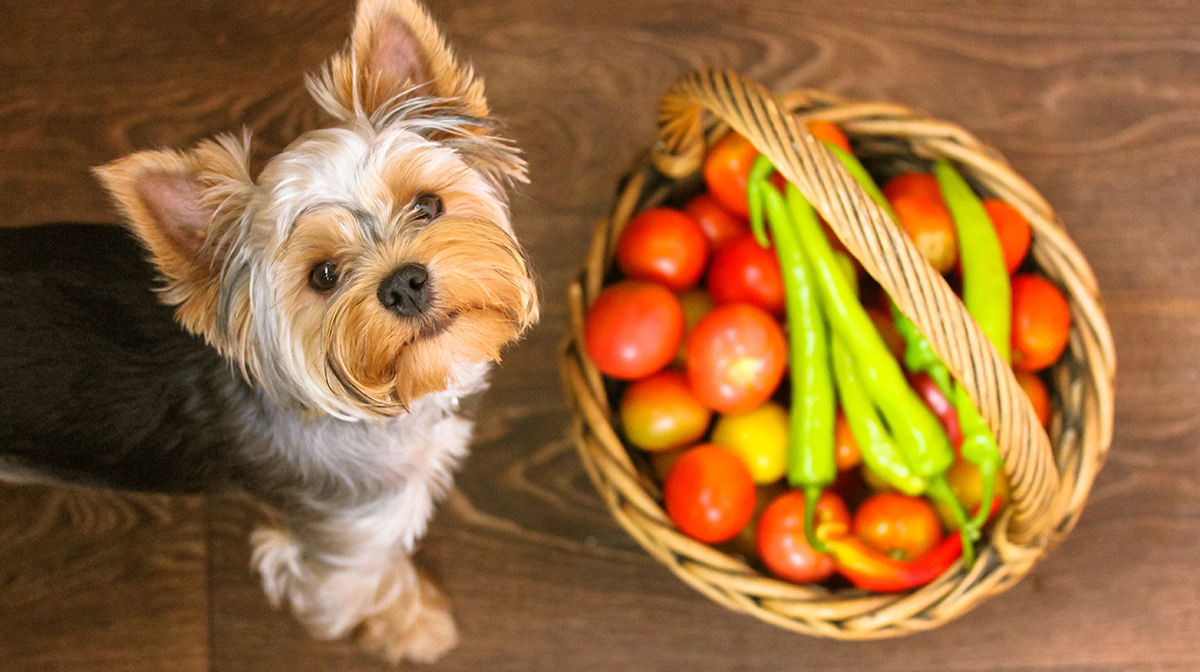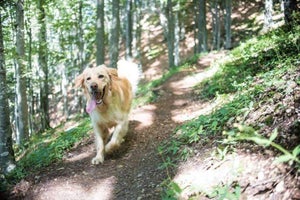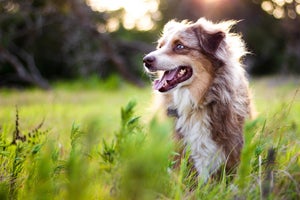
Best vegetables for dogs: Your complete guide
When you’re getting dinner ready, you’ve probably noticed your dog waiting “patiently” for a delicious treat. Whilst the urge to give them some food as you cook can be overwhelming, you need to make sure what they’re eating is safe.
When it comes to vegetables, they can be a great source of nutrients and fibre for our furry friends, providing vitamins to boost their health and wellbeing. However, some vegetables can be toxic to dogs, so you must be aware of what you can and can’t feed your pet.
Read on to find out what the best vegetables for dogs are and why some veggies should be avoided altogether. We will also answer some common queries, such as what vegetables are bad for dogs?, what raw vegetables are good for dogs?, and cover why complete and balanced pet food should always be a priority over raw or cooked vegetables.
What vegetables can dogs eat?
As we mentioned above, not all vegetables are safe for dogs to eat. A general rule of thumb is that most colourful vegetables are beneficial for a dog’s health, such as carrots, bell peppers, and green beans. Many dog safe veggies contain phytonutrients that are rich in antioxidants to fight diseases and aid in brain and eye function.
It’s important to remember that whilst dogs are omnivores, their diet does not need vegetables like humans. Instead, dogs are more carnivorous, with vegetables only providing occasional supplements rather than being dietary staples.
Let’s have a look at safe vegetables for dogs:
Green beans (unsalted)
- Broccoli
- Celery
- Cucumbers
- Potatoes
- Sweetcorn
- Tomatoes
- Parsnips
Cauliflower
- Parsnips
- Carrots
Lettuce
Courgettes
- Bell peppers
Spinach
Mushrooms (non wild)
Cabbage
Brussels sprouts
Pumpkins
Peas
Sweet potato
It is crucial that you prepare vegetables before feeding a dog to avoid possible choking and ensure proper digestion. Make sure you remove all stems, strings, seeds, leaves, pits, and cores, and wash the vegetable thoroughly beforehand. Finally, cut them into small pieces to avoid choking hazards, especially when feeding smaller dogs.
Which vegetables are good for dogs?
We must point out that there is a difference between what vegetables dogs can eat and what vegetables are good for dogs. This difference tends to come down to a vegetable’s nutritional value and its health benefits.
Of the vegetables mentioned above, not all are fully beneficial. For instance, raw potatoes, sweetcorn, unripened tomatoes, spinach, mushrooms, lettuce, and celery hold little nutritional value for dogs.
Meanwhile, here are vegetables that are good for dogs:
Carrots - Carrots are great for dogs, but only in moderation due to their high sugar content. Nevertheless, carrots are high in fibre and low in calories, as well as containing beta-carotene that produces vitamin A to support overall health.
Green beans (unsalted) - Although low in calories, green beans help a dog feel full. They contain iron, protein, calcium, and fibre, as well as vitamins A, B6, C, and K.
Pumpkins - Pumpkins are high in fibre, vitamins, and minerals, helping ease digestive issues like constipation in dogs. Avoid pumpkins with added sugar, fat, salt, or spices, as these can be dangerous to dogs.
Cabbage - Packed with fibre and antioxidants, cabbage can aid a dog’s digestive system. This vegetable also contains iron, protein folate, calcium, magnesium, manganese, riboflavin, and vitamins A, B6, C, and K. Feed sparingly as cabbage can cause increased gas in dogs.
Courgettes - Courgettes that are raw, cooked, or steamed are beneficial in small chunks, being low in cholesterol, fat, and calories. They are loaded with minerals, antioxidants, fibre, and vitamins A, B6, C, and K.
Bell peppers - All colours of bell peppers are healthy for dogs, containing vitamins A, B6, C, and E, and lutein promoting eye, coat, and skin health in dogs.
Which raw vegetables are good for dogs?
There has long been a debate over what raw vegetables are good for dogs, and whether canned or frozen veggies are healthier. Ultimately, canned or frozen veggies are better than no veggies at all, but can sometimes lose some nutrients during processing. Raw vegetables tend to contain more vitamins, minerals, and fibre, contributing to a dog’s overall health.
Find out what raw vegetables are good for dogs to eat below, but remember to prepare each one before feeding your furry best friend.
Bell Peppers
Peas
Brussels sprouts
Broccoli
Celery
Cabbage
Swiss chard
Carrots
Cauliflower
Butternut Squash (cooked)
Parsnips
Potatoes (cooked)
Sweet potato (cooked)
Courgettes
Make sure you come back to this list when checking what raw vegetables are good for dogs!
What vegetables are used in dog food?
A number of vegetables can be found in commercial dog food, providing vitamins, minerals, and nutrients to support their immune system, digestive function, as well as skin and coat condition.
Before you decide on what to feed your dog, it is recommended that you consult with a veterinarian to find out what diet suits your pup’s specific needs. Their breed, size, and age can impact what foods are safe or not.
The vegetables most commonly used in dog food are:
Carrots
Sweet potatoes
Potatoes
Peas
Green beans
Beets
Broccoli
Kale
Spinach
Corn
Soybeans
What vegetables are bad for dogs?
As a pet owner, it is crucial to understand what vegetables are bad for dogs. When feeding vegetables for dogs, a few should be avoided at all costs. Some cause digestive issues whereas others can be toxic and, in some cases, lethal for dogs. So, even if your dog is jumping around or giving you the puppy dog eye treatment for a treat, you should always triple check what is safe to feed them.
Below is a list of vegetables for dogs that can be toxic and dangerous:
Onions
Garlic
Chives
Leeks
Wild mushrooms
Onions, garlic, leeks and chives are all part of the Allium plant family and are toxic to both dogs and cats. When consuming onions, a dog can suffer from vomiting, stomach pain, nausea, and diarrhoea. If onions are fed regularly, they can cause red blood cells to rupture, resulting in a wide range of serious health issues.
It is known that 100 of the 50,000 species of mushrooms in the world are poisonous to dogs. Therefore, all wild mushrooms should be avoided. Always check your garden for mushrooms and remove them if found.
We want to mention avocados too. Although they are technically a fruit, many mistake them for vegetables and wonder if they can be fed to dogs. The answer is no, avocados contain a fungicidal toxin that can be harmful to dogs, so stay away!
If your dog eats any of the above, contact your veterinarian immediately.
Which vegetables cause gas in dogs?
Some vegetables can cause flatulence (farting) in dogs. Typically, this is down to a high fibre content and sugar that is not digested properly in a dog’s stomach, causing bacteria to ferment, resulting in wind and bloating.
The vegetables most prone to causing gas in dogs are:
Broccoli
Brussels Sprouts
Cauliflower
Cabbage
Peas
Although these vegetables can cause bloating and gas in dogs, they are safe when fed in moderation. Introduce these vegetables slowly and monitor how your dog reacts. Also, lightly cooking these veggies can help break down the fibre content, making them easier to digest. Finally, always mash or chop them into smaller pieces, and consult with your veterinarian if your dog experiences persistent gas or digestive issues.
Although dogs can be offered some fruit or vegetables alongside their main meals, it is not essential. Complete and balanced prepared dog food, tailored to meet the nutritional requirements of your dog's life-stage and life-style, provides all the nutrients your dog needs in just the right amounts.
Save this guide to remind yourself what vegetables are good for dogs and what vegetables to avoid feeding them.
FAQs
What is the healthiest vegetable for dogs?
The healthiest vegetables for dogs tend to be the most nutrient-rich. For instance, carrots are often considered very healthy as they are low in calories, rich in vitamin A, and help support a healthy immune function, eye health, and dental health.
Can I give my dog vegetables every day?
Yes, you can give your dog vegetables every day, as long as they are over six weeks old. However, it is recommended that fruit and veg consumption makes up only 10% of a dog’s overall diet.









